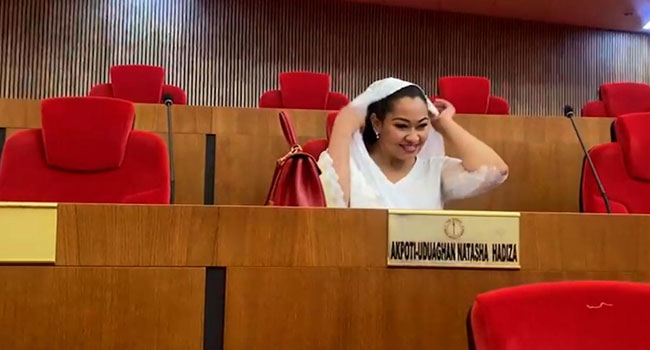Natasha Akpoti-Uduaghan, the senator representing Kogi Central, has criticised the public statements made by Olisa Agbakoba regarding her allegations against Senate President Godswill Akpabio.
Gatekeepers News reports that Agbakoba, a distinguished Senior Advocate of Nigeria (SAN) and former president of the Nigerian Bar Association (NBA), had sent a letter to Akpoti-Uduaghan on April 14, requesting that she retract her sexual harassment claim against Akpabio. In the letter, he also sought evidence to substantiate her allegation that Akpabio had s3xually harassed her on December 8, 2023.
In her response, dated April 30, Natasha refuted Agbakoba’s claims, stating that she had not received any correspondence from him.
“I place it on formal record that no such letters have ever been served upon me by post, courier, or personal delivery,” she wrote.
“The imputation of recalcitrance is therefore inoperative.”
Natasha said she had maintained silence out of respect for the doctrine of lis pendens — a legal principle that discourages public commentary on matters before the courts.
She explained that two suits are currently pending: one initiated by Akpabio’s wife at the FCT high court demanding N250 billion in damages, and another filed by her at the federal high court in Abuja, challenging her suspension from the senate.
“While Suit No. FHC/ABJ/CS/384/2025 is unrelated to the s3xual harassment allegations I made against the President of the Senate, Suit No. CV/816/2025 is directly related to the allegations of sexual harassment instituted by your client’s spouse, on which issues have been joined,” she said.
“It is improper for any party to make extrajudicial comments.”
She also criticised Agbakoba for what she described as double standard, noting that his client’s legal team had relied on the sub judice rule to block a senate investigation, yet had now resorted to the media to demand answers.
“A litigant may not approbate in the courts and reprobate in the press,” she said.
On her six-month suspension from the senate,Natasha accused Akpabio of presiding over his own case and denying her fair hearing, in violation of natural justice principles.
“Nemo judex in causa sua: no one ought to be judge in his own cause,” she wrote.
She also dismissed suggestions that her past interactions with Akpabio amounted to contradictions in her complaint, saying civility should not be mistaken for consent or comfort.
“To do so trivialises a serious concern of sexual harassment, especially in a workplace using a dominant position,” she said.
“The nature of your demand for evidence in this manner, at the instance of your client, simply indicates a broader misconception of what truly amounts to sexual harassment as prescribed in several global protocols.”
Natasha maintained that Agbakoba had no legal authority to demand that she substantiate her claims outside the court process.
“A private legal practitioner, however distinguished, is not vested with adjudicatory authority under the Constitution or any statute of the Federal Republic,” she said.
She further urged Agbakoba to advise his client on the implications of presiding over proceedings in which he is personally involved.
“I respectfully invite you to provide your client with a comprehensive advisory that addresses the entirety of the factual matrix,” she wrote.
She restated that her complaint stands as filed.
“I stand by my complaint as lodged on 28th February 2025 and as pleaded in my Defence and Counter-Claim in CV/816/25,” she said.
“This letter is issued solely to correct the public record and to prevent a constructive admission being inferred from silence.”
She asked that any future correspondence be directed through her lawyers.
On Sunday,Natasha issued a satirical apology letter to Akpabio on her Facebook page.
Natasha expressed her “deepest sarcasm and utmost theatrical regret” for what she described as the “grievous crime of possessing dignity and self-respect” in Akpabio’s presence.
She reflected on her “unforgivable failure to recognise” that, in certain legislative circles, success may not be achieved through merit but rather through compliance of a personal nature.










